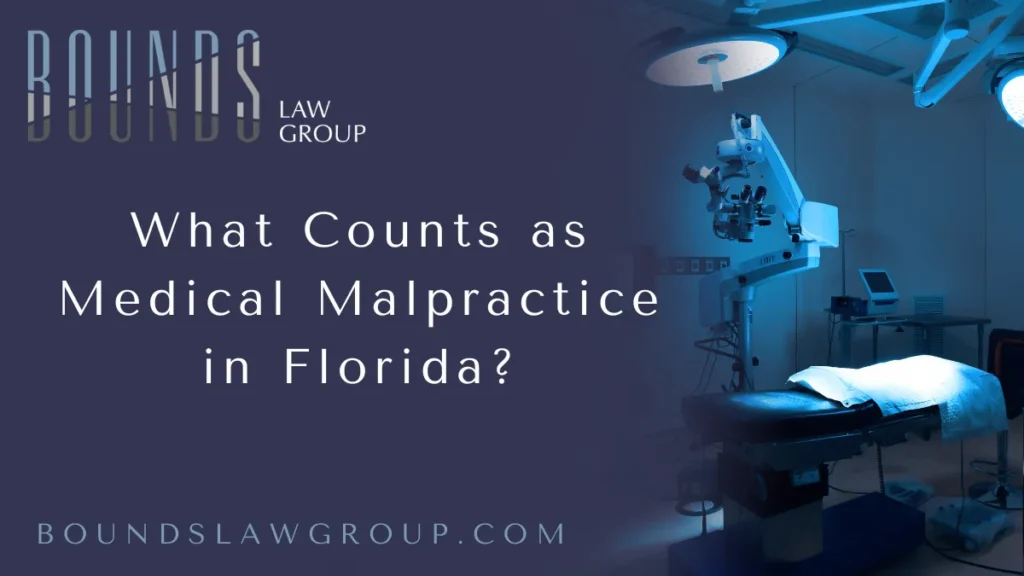
The Florida medical negligence definition is essential for anyone who believes they have suffered harm due to substandard medical care. At Bounds Law Group, we specialize in holding healthcare providers accountable for their actions. This comprehensive guide outlines exactly what qualifies as medical malpractice in Florida, how liability is determined, the role of comparative negligence, and what your legal rights are if you’ve been affected.
Contact us today through our free case evaluation form or call 877-644-5122.
Florida Medical Negligence Definition Explained
Medical malpractice, or medical negligence, in Florida is legally defined as a healthcare provider's breach of the standard of care, which directly causes injury or death to a patient. The standard of care refers to the level of skill, knowledge, and care that a similarly trained healthcare provider would have exercised under comparable circumstances.
Florida Statutes §766.102 requires a valid medical malpractice claim to prove:
- A doctor-patient relationship existed.
- The provider breached the prevailing professional standard of care.
- That breach directly caused the injury or wrongful death.
- The injury resulted in significant damages.
The legal threshold in Florida is high, requiring detailed evidence and expert testimony to establish negligence.
Common Examples of Medical Malpractice in Florida
Knowing what qualifies under the Florida medical negligence definition is key to identifying if you have a case. Below are common examples that often result in successful claims:
Misdiagnosis or Delayed Diagnosis
When a physician fails to identify a serious condition or diagnoses the wrong illness, the patient may miss out on crucial treatment. Cancer, stroke, and heart conditions are commonly misdiagnosed, leading to catastrophic outcomes.
Surgical Errors
Errors in the operating room, such as wrong-site surgery, accidental punctures of internal organs, or leaving surgical instruments inside a patient, are clear indicators of negligence. These events are preventable and typically fall within the scope of medical malpractice.
Medication Mistakes
Prescribing the wrong drug, the incorrect dosage, or failing to check for interactions can lead to serious harm. In Florida, medication errors are one of the leading causes of malpractice lawsuits.
Anesthesia Errors
Anesthesiologists hold a high duty of care. Administering too much or too little anesthesia, or failing to monitor the patient during the procedure, can result in permanent brain damage or death.
Birth Injuries
Negligence during prenatal care or delivery can result in lifelong disabilities for the child or fatal injuries to the mother. Common issues include failure to detect fetal distress or misuse of forceps.

Who Can Be Held Liable in Florida Medical Negligence Cases?
Multiple parties can be held responsible under the Florida medical negligence definition. These include:
- Physicians
- Surgeons
- Nurses
- Hospitals
- Clinics
- Pharmacists
- Anesthesiologists
- Dentists
- Chiropractors
- Radiologists
Even healthcare institutions can be held liable for negligence in hiring, training, or supervising their medical staff.
How Florida’s Pre-Suit Process Affects Your Medical Malpractice Claim
Florida has a unique pre-suit investigation process, outlined in Florida Statutes §766.106. Before filing a formal lawsuit, the claimant must:
- Notify the defendant of the intent to sue.
- Provide a verified written medical expert opinion stating there’s reasonable grounds for a malpractice claim.
- Wait 90 days for the healthcare provider’s response, during which they may settle, reject the claim, or offer arbitration.
This strict process is designed to reduce frivolous lawsuits, but it also means that victims need experienced legal representation to navigate the complex pre-litigation phase effectively.
Statute of Limitations for Medical Malpractice in Florida
Time is critical. Under Florida law:
- The standard statute of limitations is two years from when the injury was discovered, or should have reasonably been discovered.
- However, no case may be brought more than four years from the date the malpractice occurred (statute of repose).
- For cases involving minors or fraud, exceptions may apply.
Failing to act within these timeframes could result in your case being barred permanently.
Damages You Can Recover in Florida Medical Malpractice Cases
Once negligence is proven, Florida law permits victims to seek compensation for:
- Medical expenses (past and future)
- Lost wages and future earning capacity
- Pain and suffering
- Loss of consortium (for spouses)
- Wrongful death damages if the malpractice resulted in a fatality
While Florida previously had caps on non-economic damages in medical malpractice cases, the Florida Supreme Court ruled these caps unconstitutional in most cases. This opens the door for full compensation.
The Role of Comparative Negligence in Florida Medical Malpractice Cases
Another critical aspect of the Florida medical negligence definition that patients and claimants must know is the doctrine of comparative negligence. Florida follows a pure comparative negligence rule, which means that if a patient is found to be partially responsible for their own injuries, their compensation will be reduced by the percentage of fault attributed to them, but they can still recover damages.
For example, if a jury finds that a healthcare provider was 70% at fault for a medical injury and the patient was 30% responsible (perhaps due to not following medical advice or withholding important health information), the patient’s total damages award will be reduced by 30%. This system allows injured patients to receive compensation even if they share some blame.
Understanding comparative negligence is crucial because it influences settlement negotiations and trial strategies. Our legal team at Bounds Law Group carefully investigates all circumstances surrounding the injury to minimize any potential blame attributed to the patient and maximize the compensation recovered.
Why Expert Testimony Is Crucial in Medical Negligence Cases
In Florida, expert witnesses play a critical role in medical malpractice litigation. The court requires that an expert in the same medical field as the defendant testify to:
- The applicable standard of care
- How the defendant breached that standard
- How the breach directly caused the injury
Without a qualified expert, your case cannot proceed. At Bounds Law Group, we work with a network of board-certified medical experts to build strong, evidence-based cases.

How Bounds Law Group Can Help You Navigate a Medical Negligence Claim
Medical malpractice claims are among the most complex types of personal injury cases. Our experienced attorneys at Bounds Law Group are well-versed in the Florida medical negligence definition and the intricate requirements needed to build a successful case.
We offer:
- Free case evaluations
- Aggressive pursuit of full compensation
- Access to top medical experts
- Litigation experience against hospitals and insurance companies
If you believe you’ve been a victim of medical malpractice, complete our free case evaluation form or call us now at 877-644-5122 to speak with a qualified attorney.
The Florida medical negligence definition is the first step toward securing justice for injuries caused by healthcare provider errors. If you or a loved one has suffered due to a preventable medical mistake, don't wait. Time is limited, and expert legal guidance can make the difference between receiving fair compensation or walking away empty-handed.
Let Bounds Law Group be your advocate. Take action now and protect your rights.
Sources
- Florida Statutes §766.102 - Medical Malpractice Definitions and Standards of Recovery
Detailed legislative language regarding the standards and definitions involved in malpractice cases.
https://www.flsenate.gov/Laws/Statutes/2011/766.102 - Florida Bar Association - Medical Malpractice Overview
Offers a summary of the legal standards, timelines, and rights of malpractice victims in Florida.
https://www.floridabar.org/public/consumer/pamphlet026/ - Florida Supreme Court Ruling on Damage Caps
Discusses the decision that removed caps on non-economic damages in medical negligence claims.
https://www.floridasupremecourt.org/Opinions/2017/SC15-2298.pdf

